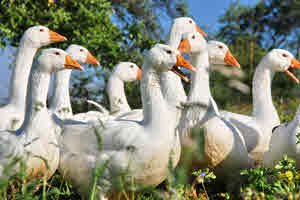There are a number of illnesses that geese can be prone to although they are a generally hardy bird. If you keep good hygiene standards and feed and worm your geese properly while giving them access to clean fresh water you should be able to avoid most health problems.
 Check the Flock
Check the Flock
You should keep an eye on your birds for any unusual nasal discharge, facial swelling or bruising, mucky vents, or cuts and scrapes. If you do a weekly check of the birds all over and each day keep an eye out for any general flock problems you should be able to avoid illness or catch it early on.
If you suspect you have a poorly goose and you are unable to identify the cause of illness you should contact your local poultry vet immediately.
Geese can hide illness well and often by the time symptoms arise it may already be too late for treatment which is why you should be prompt in either taking the goose to the vet or if this is not possible be prepared to home cull the bird to prevent suffering.
Worms in Geese
There are a number of worms that can infest geese, but the two most troublesome are gapeworm and gizzard worm. Gapeworm gets into the throat and causes the bird to breathe harshly, cough and open and shut its beak in distress. Gizzard worm can also be very harmful. It burrows into the gizzard causing weakness, listlessness and loss of weight. (Suspect its presence if a young goose is sitting down a lot). In young birds, death can follow quickly so vigilance is needed.
All worms can be treated with Flubenvet mixed into the feed according to the manufacturer’s instructions. This is the only wormer which is licensed for use with all poultry and waterfowl. All incoming geese should be wormed as a matter of course, and then twice a year after that. Prevent worm build up by always providing plenty of fresh water, preferably on a mesh stand to prevent a mucky area building up. Keep the birds on fresh ground as much as possible, and during periods of confined conditions, ensure that they have plenty of clean, deep, dry straw or wood shavings.
Lice and Mites Affecting Geese
When geese are raised in proper conditions, external parasites are unlikely to be a problem. However, if you observe a goose scratching, then catch it and part the feathers of the area being scratched. Do so in good light as these parasites are very small. They can be dealt with by using an insecticidal powder or even a spot on treatment (consult your vet) on the birds themselves, and then treating the housing or coop.
If goslings are being raised by a broody hen, ensure that she is free of lice and mites beforehand. As always, prevention is best. Geese raised in clean surroundings, particularly those with access to swimming water are unlikely to be infested.
Staggers (Heat stress)
This is a condition that primarily afflicts geese, with symptoms of the bird staggering about and falling over. It is caused by over-heating that may arise from having insufficient drinking water and shade in hot conditions. It may also be the result of housing a goose in badly ventilated conditions. As referred to earlier, it is a bird of the outdoors and can cope with cold far better than heat.
Bring the affected bird into a cool place and encourage it to drink. Pouring a little cold water over the head can also be beneficial. If it is badly affected, plug in a fan to create a cool breeze
Diarrhoea in Geese
White diarrhoea flecked with blood, may be indicative of Coccidiosis in goslings, as referred to earlier. Greenish diarrhoea can be a sign of parasitic worm infestation (See Worms above). Brownish diarrhoea that is also accompanied by slow growth and feathering may be an indication of Enteritis.
Coccidiosis
This is unusual in geese, but can affect young goslings. Coccidia are organisms that affect the intestines and are passed in the droppings. The symptoms are severe: blood-stained, white diarrhoea, a hunched up stance and inability to stand properly. Contact the vet immediately for the necessary preparation, such as Baycox. Ensure that the birds have clean, dry litter. Warm, wet and fouled bedding provides the ideal conditions for the spread of the disease.
Aflatoxin Poisoning
Aflatoxins are produced by the moulds Aspergillus flavus and A. parasiticus. These are found on cereals, bread and other foodstuffs that are old or have not been stored properly. Never feed mouldy bread or old feeds to waterfowl!
Botulism (Limber neck)
This condition is caused by toxins arising from the bacterium Clostridium botulinum. Stagnant water, perhaps with dead animals in it, is the usual cause, which is why all waterfowl need clean, well-oxygenated water when bathing. Symptoms include weakness, lack of coordination, and drooping of the wings, eyelids and neck, leading eventually to paralysis and death. An antitoxin is available but is only effective in mild cases. Prevention is best.
This article contains extracts from Starting with Geese by Katie Thear and used with permission of the publisher
Further Articles All About Geese
- Breeds of Geese & Breeding Geese
- Geese Diseases, Parasites, Worms, Lice & Mites
- Housing Geese, Pasture, and Safety
- Introduction to Geese & Feeding Geese
- Rearing Geese for the Table from Starting with Geese

